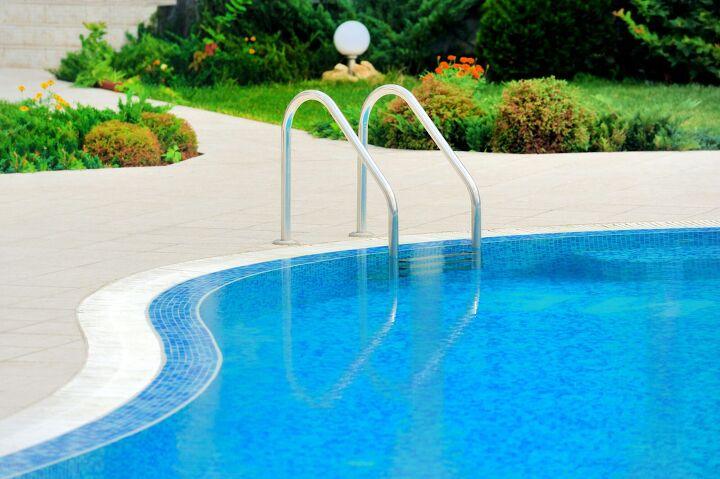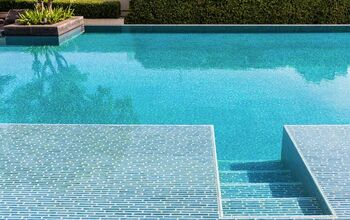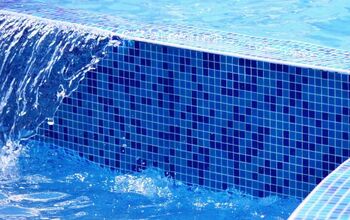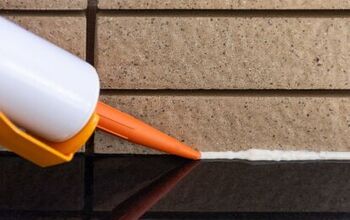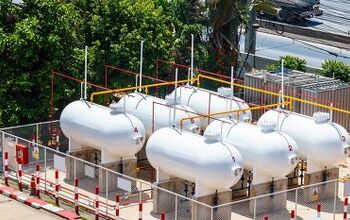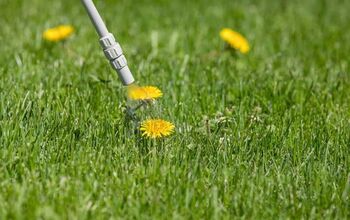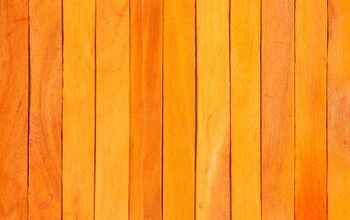How To Clean Pool Tile

Having your own private pool on your property is an amazing bonus, and likely makes you one of the most popular neighbors on the block in the summertime. Maintaining a pool, however, can be a bit costly when you use a professional cleaning service. This is why many pool owners try their best to treat and clean pools without the help of professionals. But sometimes regular pool maintenance is not enough, and your pool can look dirty or stained. When you notice your pool tile is starting to stain, how do you clean it?
There are several methods to clean your pool tile. You can use natural methods when cleaning pool tile like baking soda or vinegar. You can opt for a specialty pool tile cleaner, of which there are several. It’s possible to use a scrubber or pumice stone to remove stains, You can use a pressure washer as well, but make sure you drain the pool and use the correct PSI.
When you notice stains forming on your pool tile, don’t stress. There are plenty of ways to clean the tile in most cases. There are organic methods for those who don’t like using chemicals, and also those that involve a bit of elbow grease. But before you select a cleaning method, you should first know a little bit more about your pool tile stain. Identifying the stain will help you know how hard the stain is to remove, and what methods work best to clean it.
What Is The Waterline Stain On My Pool Tile?
While there are several types of stains that can appear on your pool tile, the most common is a white buildup along the waterline. This white buildup is not only unsightly, but it is also often very difficult to clean. This stubborn white stain is usually calcium buildup.
Calcium buildup is usually the result of calcium carbonate separating from the water, and finding a new home on the pool tile. This buildup is sometimes unavoidable, as it is a byproduct of pool cleaning and sanitation. A pool with imbalanced chemicals is far more likely to see high levels of these white waterline stains.
Four Methods For Cleaning Pool Tiles
1. Clean Your Pool Tile Using Organic Materials
If you are worried about harsh cleaning chemicals getting into your pool water, you should try using some natural and organic products to clean your pool tile. Try combining baking soda, water, and a bit of dish soap. Apply this with a sponge and scrub the tile. This is effective at removing calcium carbonate stains and other pool tile stains.
You can also try using vinegar to clean pool tiles. Using vinegar and a sponge is a great natural and organic way to get rid of a variety of stains without using harsh chemicals.
2. Try Brushing Off The Stain On Your Pool Tile
Using a brush is a popular way to clean pool tiles. Bristles on various cleaning brushes are great at removing stubborn stains like calcium carbonate or even mold and other bacteria and mold-based stains.
Make sure you use the right type of brush though. There are several brushes that are safe to use on pool tiles. Others, however, can scratch and damage the enamel on the tile. This type of damage can not be undone, and repairing scratched tile is very expensive, so be careful.
Pumice stones are also very popular tools for cleaning pool tile. When it comes to pumice, however, remember there are several types (just like brushes). Purchase pumice that is specifically marketed for pool cleaning. Pumice stones are highly effective, but are a bit labor intensive, and not ideal for frequent full-pool cleaning.
3. Clean The Pool Tile With A Cleanser
One popular and straightforward way to clean your pool tile is by using a cleanser and pool clarifier specifically designed for pool tile. You might want to consult a professional when you first buy a pool cleaner. This is because there are all sorts of pool tile cleaners specific for different stains and designed for different surfaces.
Once you find the right cleaner, it will help target your specific scaling issues and stain problems. The perk to using these pool cleaners is knowing you are using the right chemicals that effectively target stains and are safe for the pool and its surfaces. Using other chemicals to clean the pool can damage the pool, your skin, and even the balance of the pool water. So, make sure you use the right chemicals if you go this route.
4. Use A Pressure Washer On Pool Tile
If you happen to have a pressure washer, you might wonder if it’s possible to use a pressure washer to clean pool tiles. The answer is — sometimes. Pressure washers are great at lifting and removing difficult stains and refreshing tarnished surfaces, but they can also cause some irreversible damage.
First, make sure you drain your pool before using a pressure washer. Once the pool is appropriately drained, you can target the stained pool tiles. Usually, you should use a PSI of somewhere between 1200 and 2600 to clean the tile. Each tile type has a different strength and threshold, so make sure you use the right PSI for your tile type.
This method is highly effective, but it is best when doing a seasonal deep clean, as it involves draining the pool, so it is not ideal for regular cleaning.
How Often Should You Clean Pool Tiles?
Now that you know all the best ways to clean pool tile, you should next work on creating a pool cleaning schedule. But how often do you need to clean pool tiles? The answer is a bit complex, as it depends on a few factors. These factors include the type of chemicals in your pool, the size of your pool, the vegetation around the pool, and even the climate. Regardless of these variables, however, there are certain guidelines you should follow.
For one, you should always address stains whenever you see them. So, as a rule, clean the pool tile whenever you notice it is dirty.
But noticing pool tile stains is not the only (or even best) way to create a pool cleaning regimen. In general, light cleaning should be done weekly, or at least monthly. This will significantly reduce that hard-to-treat calcium buildup and other pesky stains.
You should also do at least two deep pool cleanings a year. If you live somewhere with seasons, consider doing a major pool cleaning before you fill your pool, and at the end of each pool season, so a minimum of two per year. This will help keep your pool tiles looking clean and pristine.
Ways To Prevent Stains On Pool Tile
Maintain Proper Chemical Levels
The best way to prevent calcium and other chemical buildup along your pool tile water line is to properly maintain the chemical levels. Regularly testing and adjusting chemical levels is essential to pool maintenance, and it will help prevent many types of stains.
Seasonal Tile Scrubbing Along The Water Line
Creating a pool tile cleaning schedule is also a great way to prevent unnecessary stain buildup. After all, just like with all stains, the quicker you address pool tile stains, the easier they are to clean.
Invest In A Pool Vacuum
Pool vacuums are excellent at cleaning your pool. They work great and are easy to use. If you regularly run your pool vacuum, you are less likely to experience stains and buildup on your tile, especially in those hard-to-clean areas in the deep end of the pool.
Skim Off Debris And Leaves Regularly
Debris is bound to fall into your pool. But when you neglect to remove it, bacteria, slime, and stains can occur. Make sure you are diligent about removing leaves and debris from the pool when you notice it.
Summing Up How To Clean Pool Tile
Cleaning pool tile yourself is something anyone can do to help save money on pool maintenance. There are several ways to clean pool tiles. You can opt to use organic cleaners like baking soda or vinegar. There are also chemical cleaners, pumice stones, and scrubbers. You can even use a pressure washer to clean pool tiles. But before cleaning your pool tile, make sure you are using the correct method, as damaging your pool tile is a costly mistake.
Related Guides:

Tom Gaffey is an expert writer who currently resides in Washington D.C. Tom has a passion for real estate and home improvement writing, as well as travel and lifestyle writing. He lived the last twelve years in Hawaii where he worked closely with luxury resorts and event planners, mastering his knowledge of aesthetics and luxury products. This is where he found his passion for home improvement and a keen interest in DIY projects. Currently, Tom resides in Washington D.C, and also working on his debut fiction novel.
More by Tom Gaffey



